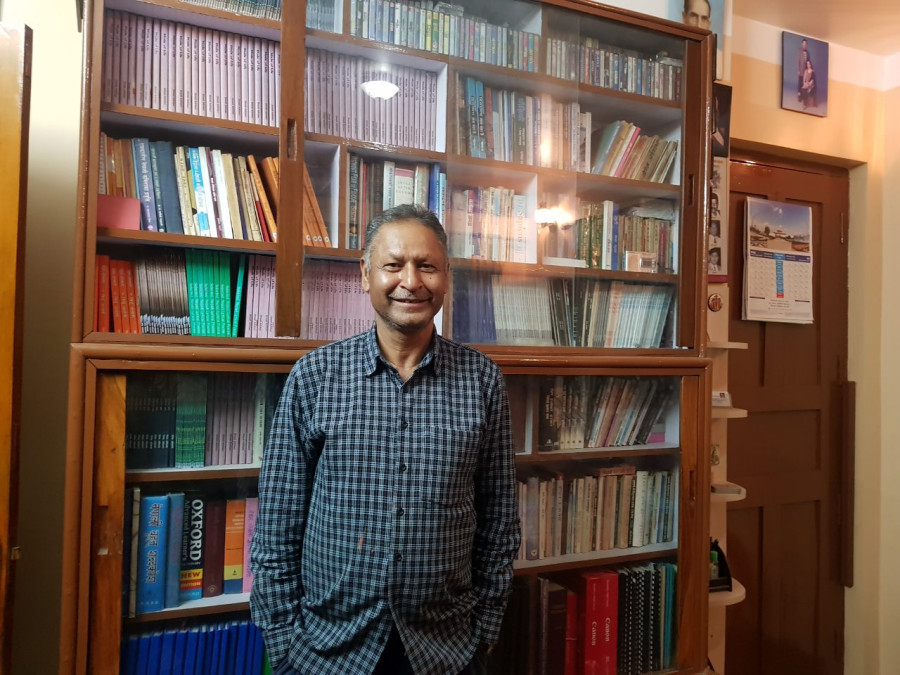Interviews
Reading has no negative effects whatsoever
Dinesh Adhikari is a famed poet and lyricist whose poetry collection ‘Atirikta Abhilekh’ was awarded the Madan Puraskar, Nepal’s most prestigious literary award in 1999. Adhikari has received more than two dozen awards in his lifetime for his contributions to Nepali literature and music.
Asmita Manandhar
Dinesh Adhikari is a famed poet and lyricist whose poetry collection ‘Atirikta Abhilekh’ was awarded the Madan Puraskar, Nepal’s most prestigious literary award in 1999. Adhikari has received more than two dozen awards in his lifetime for his contributions to Nepali literature and music. He’s behind the words to timeless classics such as ‘Timi jun rahar le’, ‘Yo samjhine mann cha’, ‘Laija chari’, and ‘Pani pani’, among others, sung by a host of famous singers, from the legendary Narayan Gopal to modern rock icon Yogeshwor Amatya. In this interview with the Post’s Asmita Manandhar, Adhikari shares his favourite reads and the inspiration behind his writings. Excerpts:
How did you first come to love books?
I grew up in a household where reading was essential. My fathers and brothers loved reading novels while my mother used to read religious texts out aloud. When you are surrounded by people who love reading, you have books all around you. So I picked up what was available to me at that time and I have to say I have never looked back. Later, I developed a habit of buying extra books along with my course books. Come to think about it, I have always loved books.
What was the last book you read and did you like it?
I recently read a poetry collection by Banira Giri titled Kathmandu Kathmandu. I have always liked Giri’s poems and this book, along with her other publications, was presented to me by her husband. As Giri has been losing her memory in the recent years, this book struck an emotional chord with me as well.
What are your top picks from the books you’ve read that you would recommend?
It is difficult to choose only few books out of everything I have read since my youth. But I tend to compartmentalise according to the genre. So for this one, I am choosing to share my top picks from my favourite poetry publications. My top six picks are, Aamako sapana by Gopal Prasad Rimal, Muna Madan by Laxmi Prasad Devkota, Gauri by Madhav Ghimire, Ghumne mech maathi andho manche by Bhupi Sherchan, Basu Shahika pratinidhi kabitaharu by Basu Shahi and Jeevan thayamaru by Banira Giri.
What books are currently on your wishlist?
There is a memoir by a writer whose surname is Tuladhar, I really cannot recall his name right now, but his autobiography is certainly on my wishlist. I have heard that after the publication of his autobiography, his family members scouted most of the book shops and destroyed all the copies they could find. From what has been said, it is the most honest memoir in Nepali literature, without any embellishments. But since most of its copies were destroyed, I haven’t had the chance to get a hold of it. But I know someone who has a copy and has promised to lend it to me. I look forward to reading it.
Why do you think reading and writing is important?
Not everyone can reach everywhere. The process of reading and writing lets one reach places that otherwise may have been physically impossible for them. Of course, it provides a mental and intellectual push but moreover, it is a certain habit that has no negative effects whatsoever on yourself or your loved ones. It is a good hobby to take up!
What book has influenced you the most and why?
I cannot name one book that has influenced me or my thought process but if I have to pick, I’d say that after reading BP Koirala’s Swet Bhairavi, I was strangely moved. It made me restless and anxious and I remember feeling weird for having such a reaction to a book.
How do you draw inspiration for writing?
I remember that I first wrote a poem when I was a fourth grader and had won a poem competition. As a reward, I was presented with a notebook and a pencil—at that time, this was my inspiration. When I was a teenager, it was my desire to see my name published in the weekly magazines that fueled my drive to write. Then, when I started writing seriously, it was the positive reviews from readers and audiences that really provided me with the inspiration to produce more. So, I had different inspirations for different phase of my life. But I will conclude by saying that social acceptance and admiration was my primary drive for the most part of my life. Now, I take writing as a form of expression.




 9.6°C Kathmandu
9.6°C Kathmandu.jpg)












